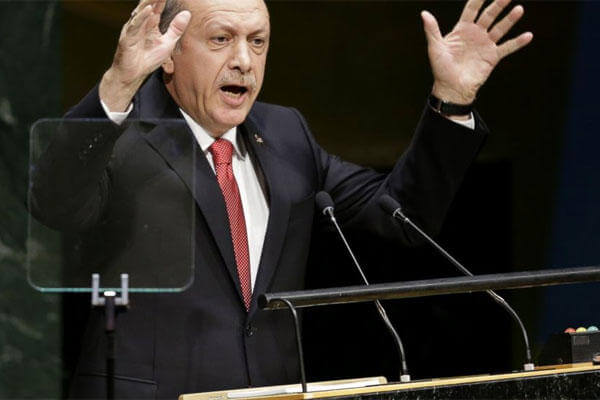Turkey rejected Thursday a tentative plan for an offensive against the Islamic State's Syrian stronghold in Raqqa outlined a day earlier by Army Lt. Gen. Stephen Townsend.
Turkish President Recep Tayyip Erdogan said he told President Barack Obama that Turkey's military was ready to move against Raqqa but he would not accept involvement in the operation by the U.S.-backed Kurdish YPG (People's Protection Units), which has often been called the most effective anti-ISIS force in northeastern Syria.
Turkey has branded the YPG and its political wing, the PYD (Democratic Union Party) as terrorist organizations. Turkey also views the YPG and the PYD as allied with the PKK (Kurdistan Workers Party), which has been labeled a terrorist organization by the U.S.
Addressing Turkish veterans Thursday, Erdogan said "I had a long conversation with Mr. Obama last night and I told him that we'll take these steps" to continue clearing border areas while preparing for an eventual move against Raqqa, Turkey's Hurriyet newspaper reported.
"I also told him (Obama) this: We don't need terror organizations like the PYD and the YPG in Raqqa. The PYD and the PKK are the same," Erdogan said. "Let's together oust Daesh (an Arabic acronym for ISIS) from Raqqa," he added.
"We have this power. What are they? They're a simple terror organization," Erdogan said in describing his phone call with Obama.
In its readout of the Obama-Erdogan phone call, the White House said Obama recognized the contributions of NATO-ally Turkey in supporting local Syrian forces in clearing the Islamic State of Iraq and Syria from border areas. The White House said Obama also stressed the need for close coordination between Turkey and the U.S. to keep pressure on ISIS.
The Obama-Erdogan phone call came shortly after Lt. Gen. Townsend, commander of Combined Joint Task Force-Operation Inherent Resolve, said the U.S. was pushing ahead with a plan for a Raqqa offensive even as the Iraqi Security Forces and Kurdish Peshmerga fighters continued to press forward on the outskirts of Mosul with the support of U.S. airstrikes and advisers.
In a video briefing from Baghdad to the Pentagon, Townsend said it was urgent for the U.S. to rally often feuding local forces in northeastern Syria, including the YPG, for an offensive on Raqqa to disrupt ISIS plots for terror attacks against the U.S. and Europe turned up by U.S. intelligence.
Townsend acknowledged that "It's going to be a tough -- very tough political environment and a security environment, I think, for our effort there" against Raqqa, the self-proclaimed capital of the ISIS "caliphate."
Townsend said the U.S. would be relying mainly on the Syrian Democratic Forces, the U.S.-backed rebel group that he said has about 30,000 fighters in northeastern Syria. "They have an Arab wing which we refer to as the Syrian Arab Corps," Townsend said of the SDF, "and a good portion of them are Kurdish forces."
"So how are we going to thread that needle with, with the SDF and our NATO allies --Turkey? Turkey doesn't want to see us operating with the SDF anywhere, particularly in Raqqa," Townsend said.
"So, the facts are these: The only force that is capable on any near frame -- near-term timeline is -- are the Syrian Democratic Forces, of which the YPG are a significant portion. So, we're negotiating, we're planning, we're having talks with Turkey and we're going to take this in steps," Townsend said.
According to Townsend's plan, the SDF would move out soon to isolate Raqqa and agreements with Turkey on a role for the YPG would be worked out later.
"We will go to Raqqa soon with that force. And I think that the Syrian Democratic Forces, to include the Kurdish YPG and the Arab -- Syrian Arab Corps, will all be part of that force to go and place isolation at Raqqa," Townsend said.
"What happens after that is still to be determined between our government, our local partners and the Turkish government. And I don't know how that will work out," Townsend said.
He said that the Raqqa offensive, once the makeup of the attacking force is decided, would probably take longer than it will to liberate Mosul, where the ISF was running up against increasing resistance as the advance moves closer to the city limits.
On the 11th day of the Mosul offensive, Army Gen. Joseph Votel, commander of U.S. Central Command, said the Iraqi Security Forces attacking the city from the south and the Kurdish Peshmerga fighters advancing from the east have inflicted heavy losses on ISIS since the offensive began on Oct. 17.
"Just in the operations over the last week and a half associated with Mosul, we estimate they've probably killed about 800-900 ISIS fighters," Votel told Agence France Presse.
Votel spoke before landing aboard a C-130 Hercules at the Qayyarah West airfield about 40 miles southeast of Mosul, which is the logistics hub for the Mosul operation.
The C-130 was one of the first aircraft to land at the airstrip called "Q-West" by the Americans.
U.S. military engineers had worked for weeks to prepare the airfield after it was heavily damaged by ISIS fighters withdrawing from the area.
-- Richard Sisk can be reached at Richard.Sisk@Military.com.





























